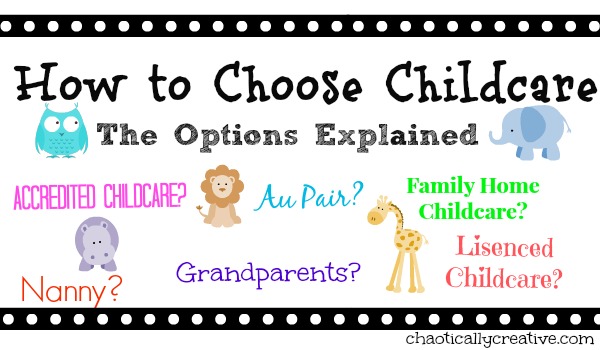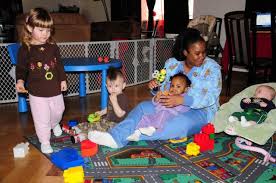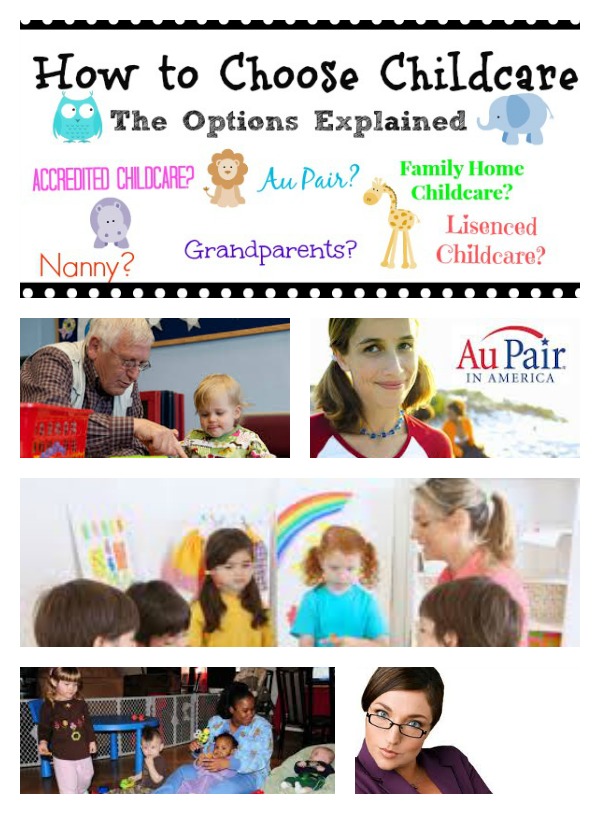One question a lot of friends and families ask me is how to choose childcare. This can be one of the hardest choices to make as a working parent. I’ve worked in a large variety of childcare settings. Did you know that there are more options than just the traditional “daycare”? There are.
I’m going to take you through a step by step guide on how to choose childcare for your little one over a course of the next few weeks. Hopefully this guide will help answer your questions and ease some of your fears.
 When selecting a childcare setting for your child first you need to know what your options are and what the difference is between each one. Your absolute first step in selecting childcare is to know what’s out there and figure out which best fits your family.
When selecting a childcare setting for your child first you need to know what your options are and what the difference is between each one. Your absolute first step in selecting childcare is to know what’s out there and figure out which best fits your family.
Types of Childcare

Nanny
An individual person who is responsible for your child’s well being, safety, and supervision. Levels of experience and education will vary. A nanny typically watches your child in your home. No degree, license or experience is required in order to become a Nanny.
Pros: Nannies make childcare very convenient by bringing their services to your home. Nanny’s are employed by you so you are able to discuss and make plans on how you want them to interact with your child. Some Nannies will also do light housework. Nannies can provide more individualized and personalized care. You can have more flexible hours of care. You won’t have to worry about peeling your child out of bed and transporting him/her to childcare.
Cons: With only one person caring for your child, accountability is very small. There are no other employees, teachers, or individuals that keep a sense of checks and balances with the Nanny. It only takes one bad Nanny to cause a lot of damage. Nanny’s can also be very expensive. I personally believe Nanny’s should make between $12 to $16 an hour depending upon education and experience and of course where you are located. As the employer you will be responsible for checking the nanny’s criminal history, withdrawing and filing taxes, etc. Think of it as you are the manager of a 1 person business all those responsibilities will be on you. Lastly, Nannies get sick and need days off. You will have to insure that you have back up care for those days. Lastly, your child will not be socialized as much as if in a group setting. (this could be considered a pro for the first couple of months of life)
I remember getting the flu as a 19 year old nanny. Unfortunately the parents could not get home to relieve me. I had to lie on the couch and “supervise” the toddler until they got home. They were super sweet and compensated me during my sick time however they did have to have grandma drive in from the coast to take care of the kids in my absence.

Au Pair
An Au pair is very similar to a Nanny however Au Pairs come from a foreign country and typically reside in your home.
Pros: Au Pairs can become almost like one of the family. Many Au Pairs are hired through Au Pair Placement Agencies. These companies usually require the Au Pair to have education in Childcare and experience as well. Au Pair Agencies also do all the prescreening for you. Other pros are the same as Nannies.
Cons: Au Pairs can also be expensive. You will have to get use to having another person living in your home. Adjusting to a new county, customs and language can sometimes be difficult.Other cons are same as a Nanny
My neighbors had an Au Pair for more than 10 years. All of their Au Pairs came from Austria. Both children learned how to speak German fluently. They had a wonderful experience with their live in Au Pairs.
Family Childcare Center
Family Childcare homes is a childcare run typically by one individual in their own home. Family Childcare homes often offer care to several different families with children in different age groups.
Pros: Your child will be in a home setting. Less exposure to illnesses associated with attending childcare with larger numbers of children. Your child will be able to socialize with other children of multiple ages. Multi-aged care is a philosophy that programs like Montessori highly endorse.
Cons: Owner has little accountability (meaning they only answer to the parents but have no direct supervisor during time of childcare). If the childcare provider is sick or goes on vacation the home center will close. Some centers are licensed and regulated by the state, some are not. Depending on age range and how many children are in care will determine if the center must be licensed.
While my husband served overseas their were 2 options for childcare; family childcare centers and the childcare centers on base. These homes were all regulated and had to abide by strict standards. One of my best friends and neighbors in Germany had her own FCC and loved it. She was able to stay at home with her child and take care of others as well.
Licensed Childcare
A licensed childcare center is a center that is regulated by the state in which you live in. Centers must abide by state laws issued by the state government. Parents and staff can report any issues to the state and then the center would be subjected to a possible inspection. Most childcare centers are licensed. Childcare centers usually provide full time care for infants to pre-schoolers. Some may not include infant care and others may include after school programs.
Pros: Your child will have ample opportunities to interact and learn from a variety of adults and other children. Policies and regulations are put in place by the state and individual centers in order to insure quality childcare. There are multiple childcare teachers so if one is sick your child will still be able to attend care. There are many individuals watching each other. If one is violating policy typically others will see and report. Childcare centers have open door policies therefore parents can come and go freely. Your child will learn not just from teachers but from other children. Licensed childcares must offer curriculum and enrichment activities throughout each day. Licensed childcares are monitored by the state, therefore they have very distinct rules and regulations that must be followed. (we’ll go over what all those are in a later post)
Cons: Childcare can be expensive. Typically Infant rates are about $180 a week. Childcare policies and philosophies are rarely changed therefore if you do not agree with the way things are run you don’t have a huge say in that. With licensing policies childcare centers are sometimes restricted in certain ways that may prohibit them to make changes. In comparison to the other types of care the ratio is higher between children and adults. Care is often less personalized. Lastly if your child is sick then you must find alternative care.
I’ve worked in many awesome childcare centers and a few not-so-awesome childcare centers. My children have also both been in childcare. If you find the right center, having your child in a center can be an amazing experience.

Accredited Licensed Childcare
Accredited Licensed Childcare is when a center chooses to become accredited by the National Association for the Education of Young Children. This is an extra step which involves many things, like teachers having to have higher education, care standards are above average and more. When a center goes through accreditation the standards are extremely high in order to receive this level. Not only does the center have to meet licensing standards but will meet the higher level of standards according to NAEYC.
Pros: Childcare is taking to an extra level of quality.
Cons: Accredited programs can be more expensive as it cost the center to become accredited.
All the pros and cons are the same as the Licensed Childcare center.
While Working in a NAEYC center I found a passion for quality childcare. The methods and philosophy for excellent care is apparent in NAEYC centers.
Grandparents or other Family
Family members can also be another great option for childcare. Who could you trust more than your own family.
Pros: The person caring for your child loves that child. You could have a greater sense of security know that your child is being cared for by a family member. Your child will get one on one care. Childcare could be FREE!
Cons: Depending on your relationship with that person you may or may not have as much control over the care of your child as you would hope for. Relying on a family member for childcare can feel like their are strings attached. You may have to bite your tongue ALOT. In other words it’s a lot easier to tell someone you are paying and who is not related to you, your grievances.
When I started as a Childcare Center Assistant Director (interim director at first) I wanted Jude 6 months at the time to be taken care of by his grandmother. I needed to fix some issues at the center before I brought him in. As excellent of care as my Mother in Law gave my son their were some things that she would do that I just had shake my head about. Like the time she trimmed Jude’s hair. There’s a reason why people go to school for that.
Making the Choice
Once you have narrowed down the type of childcare you would like to use then you will need to proceed with caution.
Stay tuned for our next post on how to choose a NANNY.
Have you worked in or used childcare before? Give us some input.
Love To Do It Yourself? Check Out Our Awesome DIY Product For Your Underwire Breakthroughs!
See What All The Excitement is About At Fix A Bra!





